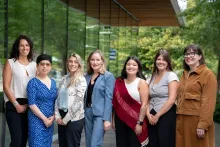
Powerful statements are made possible by disaggregated data. By making systemic racism and inequalities in our society visible, data can lead to positive change. The same data, used or collected poorly, can reinforce stigmatization of communities, leading to individual and community harm.
– BC’s Office of the Human Rights Commissioner
Last month, the Office of the Vice-President, Health (UBC Health) and the Office of the Provost and Vice-President, Academic at UBC Okanagan co-hosted a webinar designed to spark conversation between UBC and BC’s Office of the Human Rights Commissioner about the Disaggregated demographic data collection in British Columbia: The grandmother perspective report.
Disaggregated data can reveal inequalities and relationships, and the report calls for the collection of data when they are used to develop policies that address systemic inequalities and advance human rights. The report also includes recommendations to protect against discrimination and to enable populations and communities to have meaningful control over data use.
The same data that bring light to hidden truths can also be used to further entrench discrimination. As an academic institution engaged in research, we have a responsibility to ensure that doesn’t happen.
The importance of these issues is reflected in the fact that more than 140 participants attended the webinar, including faculty, staff, and students from both the Vancouver and Okanagan campuses, as well as some community members. Opening remarks from Dr. Ananya Mukherjee Reed, Provost and Vice-President, Academic and Dr. Dermot Kelleher, Vice-President, Health and Dean of the Faculty of Medicine highlighted their joint commitment to taking action as a research-intensive university.
After hearing compelling messages from several authors of the report, participants had the opportunity to ask questions and discuss the content and recommendations of the report. The panelists were:
- Kasari Govender, BC’s Human Rights Commissioner;
- Trish Garner, Executive Director of Research & Policy, BC’s Office of the Human Rights Commissioner; and
- Gwen Phillips, BC First Nations Data Governance Initiative Champion and citizen of the Ktunaxa Nation.
The webinar was the start of what will be an ongoing conversation about how The grandmother perspective report informs the responsibilities of researchers and UBC as an institution.
“The grandmother perspective report presents important recommendations, and the ongoing dialogue at UBC shows our commitment to understanding those and working together to turn them into action,” says Kim McGrail, Director of Research at UBC Health. “The same data that bring light to hidden truths can also be used to further entrench discrimination. As an academic institution engaged in research, we have a responsibility to ensure that doesn’t happen.”
Part II: February 24
Researchers and other colleagues from the Vancouver and Okanagan campuses are invited to join the second part of this series on February 24. The format will include both large and breakout group discussions, with the intent of continuing the conversation and making collective commitments to identify and act on our responsibilities—as researchers and for UBC as an institution—around the collection and use of disaggregated data.
Wednesday, February 24
4:00-5:30 pm via Zoom
Participants who weren’t able to attend the first webinar can read the report on the BC’s Office of the Human Rights Commissioner website.
Posted on February 5, 2021



